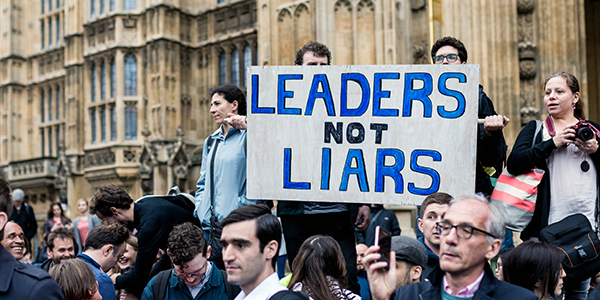It’s time to change election campaign law to stop politicians lying
How do you ensure that political campaigns don’t rely on lies and misinformation? James Organ proposes changing election campaign law to prohibit knowingly false political statements by campaigners, and suggests that involving voters, via a citizens’ assembly, could be one way to ensure the quality of political information improves in any referendum.

Picture: Ed Everett / (CC BY 2.0) licence
Another public vote – or a general election – is not going to resolve the deep political divides in the UK today. At least not yet. Not without a fresh approach to the quality of political debate during political campaigns.
Misleading and inaccurate information during political campaigns is widespread. It reduces the quality of public debate and manipulates voters. This undermines the legitimacy of results and contributes to the social divisiveness of voting. This article argues that new electoral law and greater citizen participation are needed to change this.
Both the Leave and Remain campaigns made large numbers of misleading claims that polluted public debate prior to the UK’s vote on EU membership. We had the ‘red herring’ that each household would be £4,300 worse off, if the UK left the EU, and the ‘demonstrably false’ statement that ‘two-thirds of British jobs in manufacturing are dependent on demand from Europe’. On the Leave side, we had the incorrect claim that the UK would save £350 million per week, if it left the EU, and have 1 million extra Turkish migrants, if it stayed. Over half of voters thought that the campaigning prior to the UK’s vote on EU membership was not fair and balanced.
The focus in UK electoral law is on ‘vote rather than voice’ (LeDuc, 2015, p. 139), on the fairness of the vote process, rather than on having a fair, accurate campaign. UK law only prohibits statements about ‘personal character or conduct’. In 2015, the electoral court accepted that Liberal Democrat Alistair Carmichael lied during the campaign, but he kept his seat in Parliament because he lied in relation to a political issue. This needs to change.
The false statements in the UK’s EU membership plebiscite were about political issues, rather than personal character or conduct. As a result, UK law did not help the quality of public debate. The law needs to regulate the accuracy of political statements as well.
This change to the law is essential to increase trust in the democratic process, to have well-informed voters, and to hold politicians to account more effectively. In turn, this should lead to a greater number of ‘happy losers’ in elections and referendums, and reduce the type of political and social divisiveness the UK has seen since the Brexit vote.
When should a political statement be banned?
Criteria are needed that make it clear when a false/misleading statement is just part of robust political campaigning, and when it is so misleading and/or inaccurate that it should be banned. The threshold for banning misleading statements needs to be low enough to have an impact on the quality of information during campaigns, but not so low as to reduce freedom of expression during political campaigns, or drag the courts excessively in to politically subjective decision making.
The law should cover the ‘£350 million pound a week’ claim, ‘[a] clear misuse of official statistics‘ according to the UK statistics authority. This is an objectively verifiable claim about current, ongoing practice, not a prediction. Politicians used it regularly and deliberately throughout the campaign – transported around the UK on the side of a bus. Causality between any specific campaign slogan and voting decisions is difficult to prove, but the ‘£350 million a week’ claim is likely to have significantly manipulated voters. It was the most remembered slogan from the campaign (Ipsos MORI, 2016). For these reasons, the law should prohibit this type of false statement.
It is less clear-cut for the claim that ‘we can expect to see an additional million people added to the UK population from Turkey alone within eight years’, if the UK stays in the EU. This is a misleading, well-remembered claim that is likely to have distorted public debate and influenced people’s voting decisions. It was also based on an inaccurate presentation of the legal and political reality at the time, such as Penny Mordaunt’s mistake about the UK’s veto on the BBC’s Andrew Marr show. However, banning these unsupported claims is harder to justify. The key difference to the ‘£350 million a week’ claim is that this is not a verifiably false fact. It is a prediction, albeit of something that is extremely unlikely to happen.
In the case of commercial advertising, the Advertising Standards Agency (ASA) prohibits statements if they are likely to deceive consumers and cause them to take transactional decisions that they would not otherwise take. If election campaign law followed this broader approach, the ‘Invasion of Turkish migrants’ claim may be banned. This approach would have a greater impact on the quality of debate, but could excessively draw the courts in to politically subjective issues.
Establishing clear criteria is difficult and many complex questions need addressing, including: Where does the burden of proof lie? Does the respondent need to have knowingly made a false statement? Whatever approach is taken, drafting new law will be a challenge.
Enforcing the law and accountability
An independent Office of Electoral Integrity would most likely be needed to judge whether statements are false according to the new law, and to order swift retractions and public corrections during a campaign. The Electoral Commission and ASA have already indicated they would be reluctant to take on this politically charged role, because of threats to their independence. A citizens’ jury to inform the new independent office is a more innovative option that could help increase the political impartiality and acceptance of decision-making.
An election court would then need to deal with appeals and complex cases, and issue injunctions and fines. The ultimate sanction of rerunning a national vote because of false statements could be available, but is likely to be disproportionate except in the most severe of situations.
Personal liability is a strong incentive to stop politicians using false statements during campaigns. This is relevant to the election of MPs, as in the case of MP for Oldham and Saddleworth Phil Woolas, who was ejected from Parliament for lying about his opponent’s personal conduct and character, but not in a policy-focused referendum campaign. The Misconduct in Public Office law could evolve to enable personal liability for false statements made by organisations during political campaigns. However, the Marcus Ball case against Boris Johnson over the £350 million claim, shows how difficult it is to use this law to hold politicians to account.
Bring citizens in to political campaigns
Changing campaign law is not the only answer. Deliberative instruments, such as holding a citizens’ assembly prior to referendums, would facilitate reasoned and more accurate debate – as seen in Ireland’s citizens’ assembly and subsequent referendum over reforming abortion law last year. This reduces the manipulative effect of false campaign claims and slogans on voting, and allows for fairer and more balanced campaigns. It should also help reduce the current dominance of personality and party politics.
There is a wealth of experience from around the world and clear design principles to draw upon, but deliberative instruments are still relatively new. Madrid established Europe’s first permanent deliberative body this year. There are also still a number of issues related to deliberative democracy that need further examination, such as how a citizens’ assembly should interact with Parliament. It would also not, on its own, resolve the social and political division caused by the Brexit vote.
The changes proposed here are not a magic bullet that will resolve all the democratic ills highlighted by the UK’s recent use of direct democracy. They are part of a much wider debate and systemic change. Nevertheless, reducing the prevalence of misleading and false statements is an important, specific step in the wider efforts to improve the quality and legitimacy of political campaigns. UK democracy cannot afford to have another referendum campaign like the last one.
This article gives the views of the author, and not the position Democratic Audit. It draws on the longer article, ‘Legal Regulation of Campaign Deliberation: Lessons from Brexit’, published by Politics and Governance, and available open access at here.
About the author

James Organ is a Lecturer at the School of Law and Social Justice, University of Liverpool. He is an expert in the area of participatory and direct democracy. He has published on citizen participation and the European Citizens’ Initiative, and has an upcoming edited collection titled Direct participation in a Citizen’s Europe published by ECPR. James works extensively with civil society organisations and advises EU institutions on developing EU level citizen participation. He has recently completed an EACEA ‘Europe for Citizens’ funded project on the future of EU democratic participation that held mini publics in four EU member states and online deliberation, and is part of a project developing deliberative democracy in Northern Ireland.





 Democratic Audit's core funding is provided by the Joseph Rowntree Charitable Trust. Additional funding is provided by the London School of Economics.
Democratic Audit's core funding is provided by the Joseph Rowntree Charitable Trust. Additional funding is provided by the London School of Economics.